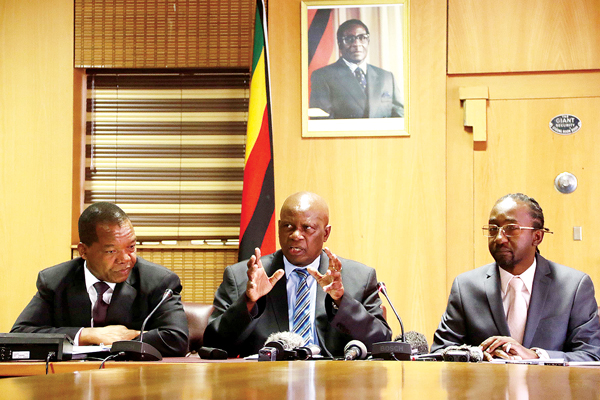
GOVERNMENT has withdrawn its latest indigenisation and empowerment regulations and announced plans to re-gazette the document, barely a week after it was gazetted, as discord reigns supreme over some of the contentious clauses of the law.
BY BLESSED MHLANGA

Addressing a joint Press briefing in Harare yesterday, Finance minister Patrick Chinamasa, Reserve Bank of Zimbabwe governor John Mangudya and Indigenisation minister Patrick Zhuwao, said the new frameworks, procedures and guidelines for implementing the Act were meant to give clarity following weeks of “robust” debate.
“We have agreed on the frameworks, procedures and guidelines for implementing the Act and as we move forward, emphasis is now on implementation of the indigenisation law, starting with the submission of the indigenisation implementation plans, which every affected company must submit with immediate effect, but no later than March 31,” Zhuwao said.
Chinamasa said the new frameworks would replace those he gazetted on December 24, adding that they now had a better document. “In this matter, there has been robust debate . . . following this robust debate, we have now come up with a much-improved product, which is very conducive for investment. So I want us to consider the frameworks as a milestone in the turnaround of our economy,” Chinamasa said.
However, a cursory look at the two documents indicates that the documents are similar, although Higher and Tertiary Education minister Jonathan Moyo claimed on Twitter that the new document had fundamental changes.
Zimbabwe ratified the Indigenisation and Economic Empowerment Act, which compels foreign investors with a $500 000 capital base to sell at least 51% of stakes to locals.
- Chamisa under fire over US$120K donation
- Mavhunga puts DeMbare into Chibuku quarterfinals
- Pension funds bet on Cabora Bassa oilfields
- Councils defy govt fire tender directive
Keep Reading
Critics have, in the past, blamed the piece of legislation for spooking foreign direct investment in an economy badly in need of fresh funding.
Chinamasa refused to shed light on the changes, saying it was the work of analysts to compare the old and new document, then comment on the amendments.
“We have now closed ranks to emphasise on the implementation. You actually thought we were not going to meet and you would continue to write and make money with your papers. Zanu PF is a democratic party and we are allowed to have differences, but now we are moving forward,” Chinamasa said.
“The economy is not suffering because of the Indigenisation Act. If anything, it is suffering because of lack of participation of the indigenous people in the economy. I have already explained in the past that we are going through a transitional period, where old businesses are dying and the old economy, much as we want it to remain, is dying and in its place, it’s being replaced by the new economy,” the Treasury chief said.
Magudya said the new frameworks adopted by government showed that Zimbabwe was open for business and was ready to do business because it did not use the one-size-fits-all approach.











